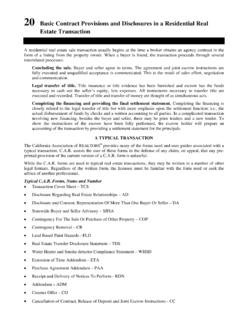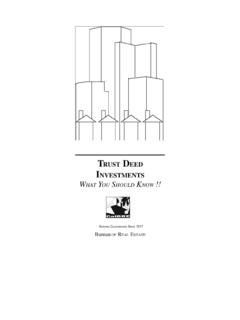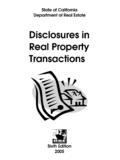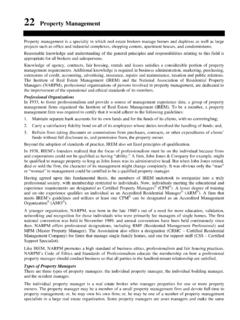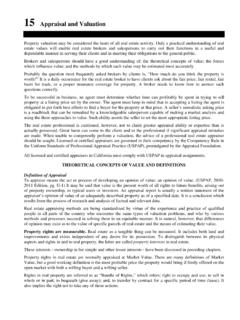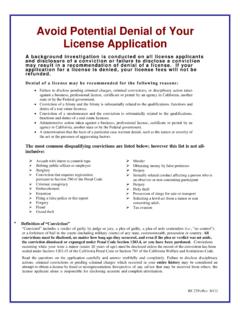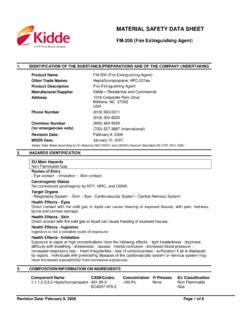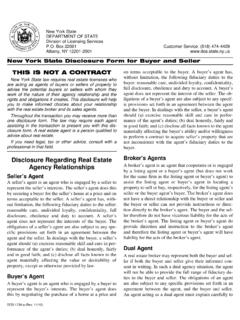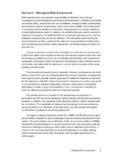Transcription of INTRODUCTION - California Bureau of Real Estate
1 10 Agency INTRODUCTION The subjects of agency and the fiduciary relationships between real Estate brokers and their principals are among the most difficult concepts for real Estate licensees to understand and apply when engaged in real property or real property secured transactions. A significant percentage of claims presented to insurance carriers offering errors and omissions coverages involve alleged negligence, professional negligence, negligent misrepresentations and breaches of fiduciary duty by real Estate licensees. Equally, civil actions brought against real Estate licensees by the public usually include causes of action for negligence, professional negligence, negligent misrepresentations and breaches of fiduciary duty.
2 The purpose of this Chapter is to provide the reader with an understanding of the concept of agency and fiduciary duty in the expectation that those who practice as real Estate licensees will better perform their responsibilities to the public they serve. Fiduciary duties include, among others, loyalty; confidentiality; the exercise of utmost care (and in certain fact situations, reasonable care); full and complete disclosure of all material facts; the obligation to account to the principal; the obligation to act fairly and honestly and without fraud or deceit.
3 And the duty to "explain" and "counsel" about that which has been disclosed or should have been disclosed thereby permitting the principal to make an informed and considered decision to buy, sell, lease, exchange, borrow or lend. The concept of agency and fiduciary duty is quite old. According to Civil Code 2295 (which was enacted in 1872), "An agent is one who represents another, called the principal, in dealings with third persons. Such representation is called agency." In an agency relationship, the principal delegates to the agent the right to act on his or her behalf, and to exercise some degree of discretion while so acting.
4 The agency relationship between a real Estate broker and his or her principal results in a special agency typically limiting the broker to soliciting and negotiating on behalf of the principal to the real property or real property secured transaction. (Business and Professions Code 10131 et seq.; Civil Code 2297). Generally, real Estate brokers are neither entitled to act in the place and instead of nor are they entitled to bind their principals. An agency relationship creates a fiduciary duty owed by the agent to the principal within the course and scope of the agency and the authority granted by the principal.
5 The fiduciary duty owed by real Estate brokers to their principals has been compared by the courts to the duty owed to the beneficiaries by a trustee under a trust. (Civil Code 2322, Probate Code 16000-16105.) In most real property transactions, the real Estate broker acts as an agent for someone else - the principal - who seeks to sell to, buy from, or exchange with a third party real property or a business opportunity. The real Estate broker also may be acting on behalf of another or others to negotiate a loan, the repayment of which is secured, directly or indirectly, by real property.
6 As a special agent , the real Estate licensee is authorized to represent the licensee's principal with third persons in real property or real property secured transactions. (Business and Professions Code 10131 et seq.; Civil Code et seq. and 2297.) A real Estate broker is a special agent who is authorized by the principal to carry out certain defined acts within the course and scope of the agency established by the principal. The real Estate salesperson is an agent of the real Estate broker, regardless of whether he or she is an employee for purposes of the Real Estate Law, or an independent contractor of the real Estate broker for federal and state income tax reporting purposes.
7 The broker in the real property transaction is responsible for his or her salesperson who acts as an agent of the broker. When a salesperson owes a duty to the buyer, the seller, or to any principal or party in a real property transaction, the duty is equivalent to the duty owed by the real Estate broker for whom the salesperson acts. Broker associates act as agents of the responsible broker in the same manner as salespersons. (Civil Code (b).) The existence of an agency relationship invokes a vast and often complicated body of rules and regulations which govern the rights and duties of principals and agents to each other and the obligations of both principals CHAPTER TEN 148and agents to third parties.
8 The following discussion begins with an analysis of the distinctions between general and special agents and the description of those relationships between parties which are other than agent and principal. THREE RELATIONSHIPS IDENTIFIED AND DEFINED A party may be authorized to act on behalf of or in relationship to another in various ways: 1. The relationship is that of a principal and agent , whether that of a general agency or a special agency; 2. The relationship is that of an ordinary employer-employee between the principal and the second party; 3. The relationship is that of a principal and an independent contractor who is the second party performing certain defined services.
9 1. General and Special Agents Defined General Agents A general agent is one who is authorized to conduct a series of transactions involving a continuity of service. (Civil Code 2295; Restatement (Second) of Agency, 3(1)). General agents tend to be an integral part of a business enterprise and do not require additional authorization for each transaction which they conduct on behalf of their principal. For example, a branch manager of a company may have general authority to transact the business of the branch on behalf of the company and is a general agent to that extent.
10 Special Agents A special agent is one who conducts a single transaction or series of transactions not involving continuity of service. (Civil Code 2297; Restatement (Second) of Agency, 3(2).) A real Estate broker is usually a special agent although, in appropriate circumstances, a form of general agency can arise. The distinction between a general and special agent is important when determining the extent of an agent 's authority to bind the principal to agreements made by the agent with third parties, and when defining the course and scope of the agency relationship.
